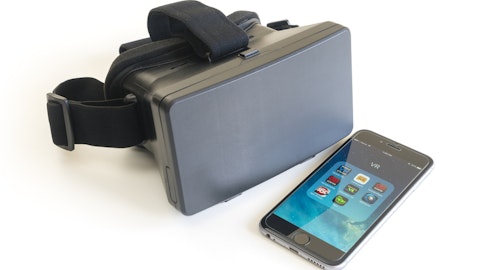What qualifies smartphones as being smartphones made in USA? For example, Apple Inc. (NASDAQ:AAPL)‘s iPhones have a label on the back that says “Designed by Apple in California. Assembled in China”, but we definitely can’t say that the iPhone is ‘made in USA’. On the other hand, according to reports, the bill of materials for an iPhone amounts to around $220 and we can assume that a larger part of the costs involves operations in the U.S. Plus, some of the iPhone parts like the accelerometer and the screen and glass are also manufactured in the U.S. Nevertheless, with over 200 suppliers located around the globe and manufacturing in China, the iPhone is far from being really ‘made in USA’. But is it likely to change soon?
Many businesses probably have very conflicting views about Donald Trump, with Apple being no exception. On the one hand, the president will most likely cut business taxes, which could allow Apple Inc. (NASDAQ:AAPL) and others to bring back the cash they have stashed overseas and return some of it to shareholders and invest in various projects. On the other hand, the President that doesn’t like to read books and apparently has no idea how international trade works, might force companies to relocate their manufacturing to the U.S.
The only way the government can make companies build their products in the U.S. is through imposing a tax on imported goods. However, with products that have complex supply chains like smartphones, such enforcement could trigger a number of complex processes, from which the consumer will primarily suffer in the end. An import tax will likely be carried over to consumers, or at least a significant part of it, because companies have to maintain their level of profitability in order to keep their shareholders satisfied.

Copyright: prykhodov / 123RF Stock Photo
Relocating production to the United States will result in huge cost increases, mainly on labor costs, which will jump higher, since the current unemployment rate of under 5% (yes, it’s 5% and not 40% like Trump implied during the election campaign) is unlikely to be able to cover the demand for labor under the new regulations, so companies will have to raise wages in order to keep or attract workers. A possible scenario is that more manufacturing processes will be roboticized, but this will negate the whole intention of laws developed to make companies build their products in the U.S.
Smartphone makers don’t build their products in the U.S. not because they hate America and want to support other countries, like China, instead. There was one attempt in recent history at U.S.-made smartphones. Back in 2013, Motorola, which was owned by Google, currently known as Alphabet Inc (NASDAQ:GOOGL), announced its new Moto X Android-powered smartphone, which it had planned to assemble at a former Nokia factory in Texas. The plant employed around 3,800 people in 2013, mainly on behalf of Motorola’s contract manufacturer Flextronics International. In 2014, the number of employees was cut to around 700 people as the devices, priced at $600 without a contract, failed to compete with iPhones, priced at $650. Even though Google lowered the price to $399, the company still didn’t manage to reach the required economies of scale and higher costs of labor and shipping parts forced Motorola to cease production. Soon after that, Google sold Motorola to Lenovo.
So, it’s obvious that Google failed in its attempt to compete with Apple Inc. (NASDAQ:AAPL), Microsoft Corporation (NASDAQ:MSFT) and others, which had overseas factories and lower costs. Last year, Alphabet Inc (NASDAQ:GOOGL) released two Pixel flagship phones, whose costs started at $650, close to Apple’s iPhones. Moreover, Microsoft released two new Lumia phones, with prices starting at $500. So, if all three U.S.-headquartered tech giants will have to choose between either supporting a border tax or relocating their manufacturing to the U.S., it will be interesting to see their strategies.
– For further reading on Apple, be sure to check out the Top Countries with Largest iPhone Market Share. Article continued on the next page.
To look at things more simplistically, even if Trump imposes a 25% tax on smartphones, it is unlikely that companies will move their production to the U.S. According to reports, Apple Inc. (NASDAQ:AAPL) already examined the opportunity to manufacture its phones in the U.S., but its manufacturing contractor Foxconn estimated that the costs for an iPhone would more than double. To minimize the costs, companies may increase their investment in plant upgrades and use more robots and automation, which won’t create as many jobs as Trump supporters might expect. On the other hand, since most parts are still manufactured in East Asia, the resulting costs in parts shipping will substantially raise the prices of final products. Some estimates say that an iPhone could cost as much as $2,000 if it were to be made in the U.S. In this way, Apple Inc. (NASDAQ:AAPL), Alphabet Inc (NASDAQ:GOOGL), and Microsoft Corporation (NASDAQ:MSFT) might face tougher competition from Chinese smartphones, whose quality has been progressively improving and which will be better off even if their prices will carry an import tax. Moreover, if companies raise the prices only on smartphones sold in the U.S., it will likely result in a new shadow economy involving people smuggling smartphones from other countries.
Nevertheless, companies seem to be more accommodating to Trump’s ideas. GM and Ford announced plans to invest in their existing U.S. plants instead of relocating some production to Mexico. Apple and Microsoft also have some plans regarding their U.S. manufacturing. In 2013, Apple started making the Mac Pro in the U.S, but the production volume is small. With Foxconn having started to employ more robots at its Chinese factories, Apple Inc. (NASDAQ:AAPL) might expand production in the States. Last year, Microsoft Corporation (NASDAQ:MSFT) started making Surface Hub, a huge (to be pronounced “yuuge”) touch-screen computer intended as a replacement for traditional whiteboards, in Oregon. Surface Hub costs $20,000 and is too big to be shipped from overseas, so it makes sense for it to be made in the U.S.
However, it remains highly unlikely that we’ll see smartphones made in USA any time soon. Apple Inc. (NASDAQ:AAPL), Microsoft Corporation (NASDAQ:MSFT), Alphabet Inc (NASDAQ:GOOGL) and others are likely to shift some production to the U.S., with the majority of it being automated. In exchange they will get tax cuts. Trump will get to brag on Twitter and on TV about what a great President he is for bringing jobs back to the U.S. and when confronted by the press that the new policies don’t work as well as intended, he or his staff will accuse the press of lying or will say they are presenting “alternative facts”
Disclosure: None





